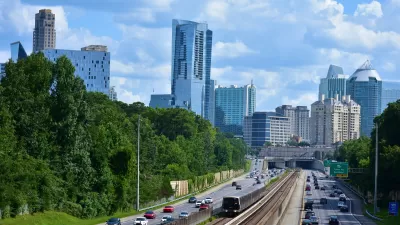The Carnegie Endowment's Shin-pei Tsay and Deborah Gordon expose five common myths and reveal three important facts on the 18.4 cent federal gas tax and present their solution to maintaining and improving America’s transportation infrastructure.
In debunking five common myths, Gordon and Tsay expose the truths for policy makers, and voters to consider:
1. "Only two countries-Kuwait and Saudi Arabia-charge lower gas taxes than the U.S. By under-taxing gasoline -- and thus under-pricing gasoline -- the United States encourages over-dependency (on oil).
2. America's transportation system is going broke. Revenue for the Highway Trust Fund is derived almost entirely from federal gas taxes." To make up the shortfall and continue current project, "(f)rom 2008 to 2010, Congress transferred $34.5 billion from general fund revenues."
3. The shortfall will increase as a consequence of the administration's new fuel efficiency standards as they translate into lower gas tax expenditures by higher-mpg cars."
Their solution to bridge the funding shortfall? A dual approach - taxing both oil producers and consumers that has the additional benefit of stabilizing volatile gas prices.
"Structuring an oil fee assessed on producers and a variable gas tax paid by consumers can further stabilize the price at the pump. When oil prices go up, the retail gas tax can be abated. The oil security fee will make up for the revenue gap. When oil prices go down, the gas tax can be slowly reinstated... The gas tax is a good way to invest in America."
Thanks to John Holtzclaw
FULL STORY: Five myths about your gasoline taxes

Planetizen Federal Action Tracker
A weekly monitor of how Trump’s orders and actions are impacting planners and planning in America.

San Francisco's School District Spent $105M To Build Affordable Housing for Teachers — And That's Just the Beginning
SFUSD joins a growing list of school districts using their land holdings to address housing affordability challenges faced by their own employees.

The Tiny, Adorable $7,000 Car Turning Japan Onto EVs
The single seat Mibot charges from a regular plug as quickly as an iPad, and is about half the price of an average EV.

Seattle's Plan for Adopting Driverless Cars
Equity, safety, accessibility and affordability are front of mind as the city prepares for robotaxis and other autonomous vehicles.

As Trump Phases Out FEMA, Is It Time to Flee the Floodplains?
With less federal funding available for disaster relief efforts, the need to relocate at-risk communities is more urgent than ever.

With Protected Lanes, 460% More People Commute by Bike
For those needing more ammo, more data proving what we already knew is here.
Urban Design for Planners 1: Software Tools
This six-course series explores essential urban design concepts using open source software and equips planners with the tools they need to participate fully in the urban design process.
Planning for Universal Design
Learn the tools for implementing Universal Design in planning regulations.
Smith Gee Studio
City of Charlotte
City of Camden Redevelopment Agency
City of Astoria
Transportation Research & Education Center (TREC) at Portland State University
US High Speed Rail Association
City of Camden Redevelopment Agency
Municipality of Princeton (NJ)





























